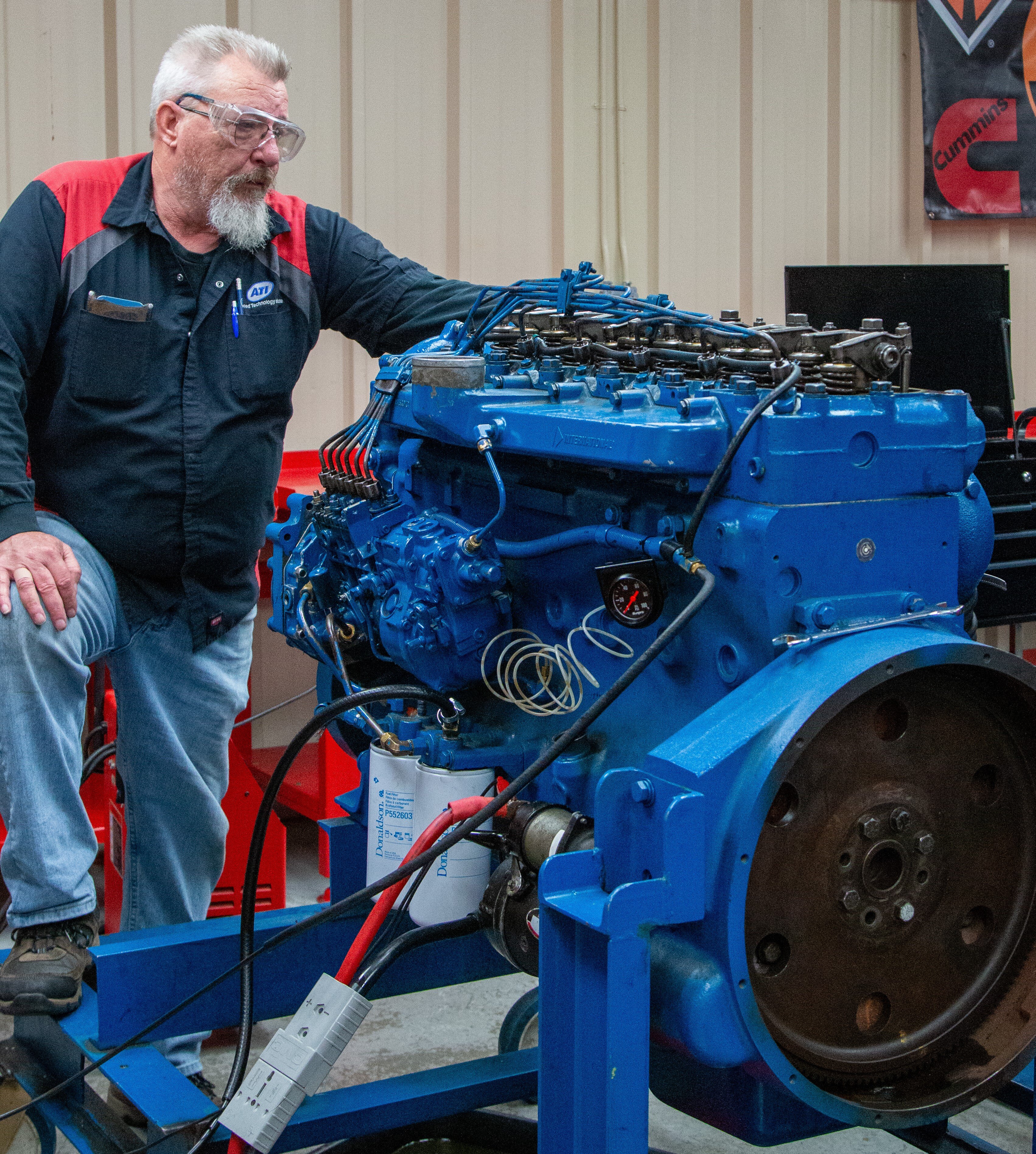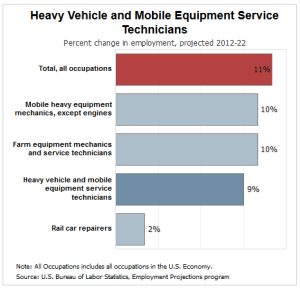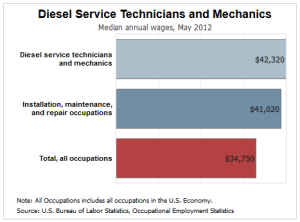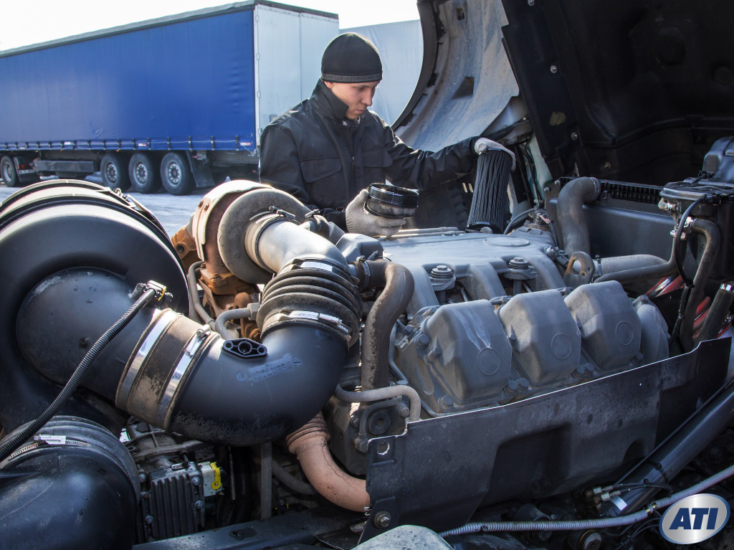A Day in the Life of a Diesel Mechanic: Salary, Facts & Figures

The structure of the U.S. economy does not solely depend on Wall Street; it is also critically dependent upon the supply chain process of transporting products throughout the country using heavy-duty diesel trucks. Heavy-duty diesel mechanics keep those semis and buses on the road, every day of the year, and that keeps our country’s infrastructure stable and secure.
“If the trucking industry stopped rolling, the U.S. economy would grind to a halt,” says business writer Stan Mack. In the United States, “Virtually every type of good travels on a truck at one point or another, adding up to about $140 billion in shipped goods per year.”
The majority of U.S. diesel mechanics work full-time, and nights and weekends are often needed, says the Bureau of Labor Statistics (BLS). Most of these professional mechanics and technicians work in one repair, maintenance, and/or garage-type facility where diagnostic tools are available, but some travel to other locations for onsite repair.
A Typical Day with Big Engines
In many of the shops, heavy-duty diesel mechanics begin their inspection by following a checklist of typical diesel engine glitches. If that doesn’t identify the problem, they may need to use diagnostic equipment to examine the engine, electrical and other systems for difficulties. Heavy-duty diesel mechanics should know how to place large vehicles on lifts so they could get underneath them to work because the average engine weighs 400-12,000 pounds!
 Diesel Mechanic Career Growth
Diesel Mechanic Career Growth
Being a heavy-duty mechanic is, like most occupations, no longer the “job” where you could get on-the-job training. It’s a professional career. The BLS emphasizes that job prospects for those with 2-year degrees or vocational school training may be easier than for mechanics without formal training. Most diesel mechanics will need a commercial driver’s license to road-test heavy-duty trucks and equipment. Most employers prefer hiring trained professionals that have diplomas or certificates of training and who are also certified by the National Institute for Automotive Service Excellence.
 How Much Does a Diesel Mechanic Make?
How Much Does a Diesel Mechanic Make?
The median salary for diesel truck mechanics was $43,820 in 2012. Even in 2012, ten percent of the heavy-duty mechanics earned $63,250 or more. The enforcement of our anti-pollution regulations should increase the need for engine and exhaust modifications. “As the stock of heavy vehicles and mobile equipment continues to increase, more service technicians will be needed to maintain them. In particular, demand for heavy equipment used in construction, mining, and energy exploration will result in employment growth for service technicians. Growth rates will vary by specialty,” according to the BLS.
Other diesel mechanic careers include:
- Aircraft support equipment – In addition to engine maintenance, an aircraft and avionics technician may perform inspections required by the Federal Aviation Administration (FAA). In 2012, the median annual wage for these professionals was $55,210. The top ten percent earned more than $76,660. The job outlook in this sector is very stable, with no anticipated decrease in the number of jobs available. NOTE: Additional training and certifications by the FAA may be required in order to work on aircraft power plants.
- Farm equipment – Heavy vehicle mechanics repair, maintain and overhaul farm machinery. Tractors, harvesters, dairy and irrigation systems are costly investments and our farmers want to keep them working for as long as possible. Annual median earnings in this sector were $36,150 in 2014, and depend on the area of agriculture in which you work. For example, technicians specializing in the sugar industry averaged $50,120/year in 2014.
- Marine equipment, ships and yachts – If you live near the ocean or a large body of water (and you like big ships), becoming a marine diesel mechanic might be for you! You could troubleshoot, maintain and repair large vessels’ engines for the government or for private companies/owners that have fleets of fishing boats. Most work is done at a marina or dockside. Annual wages vary and are dependent upon the type of vessels you work on; for example, an inland water transportation mechanic earned an average of $53,830/year in 2014 while ship and boat-building mechanics earned $37,350/year.
- Road construction equipment – If a crane breaks down during construction, it could stop the entire project until you fix the problem. Often you will need to travel to the worksite. Your training in diagnosing engine problems may help you help the road crew get back on schedule. The median average pay for heavy vehicle and mobile equipment technicians was $43,820 in 2012 with a 9% job outlook increase through 2022.
ATI has changed seen 2001 when I grad. We grad in our school cloths and had hotdogs at the end.Good school
Posted by Kenneth Parker on Tuesday, July 23, 2013
Want to Become a Diesel Mechanic? It begins with YOU.
With your Automotive Diesel Technology diploma, your career could be on the fast track within 18 months! Advanced Technology Institute could put you on the road toward an interesting and exciting occupation as a automotive/diesel professional, so why wait another day? For more information about Heavy Vehicle Technology with Service Management (AOS), call 800-468-1093. Your new life as a diesel mechanic could begin NOW.
DISCLAIMER – Advanced Technology Institute (ATI) makes no claim, warranty or guarantee as to actual employability or earning potential to current, past or future students or graduates of any educational program offered. The Advanced Technology Institute website is published for informational purposes only. Every effort is made to ensure the accuracy of information contained on the AUTO.edu domain; however, no warranty of accuracy is made. No contractual rights, either expressed or implied, are created by its content.
For more information about Advanced Technology Institute or any of our programs click here: http://www.auto.edu/ or http://ow.ly/VoydP.
Industry Knowledge
Welcome to the Advanced Technology Institute's Blog, your resource for industry insights and discussions on technologies shaping the future of automotive, heavy vehicle, hvac, welding, and other related career paths.
Explore how ATI's curriculum and hands-on learning opportunities can propel your career in the tech-driven world.

.jpg)
